| "It's not always a good place to go, the past." |
| Walter Keyes (Christopher Lee) |
| "This little war makes everything uncertain." |
| Aunt Elizabeth (Julie Christie) |
Stephen Poliakoff, the poet Laureate of British television screens, again plies his trade in dark, insidious family secrets best left buried, this time for the big screen and now new on DVD with Glorious 39.
This stately looking political whodunit, set in the immediate run up to World War Two, is a film of hairpin misdirection and audience rug-pulling. A garden path government conspiracy plot to appease Hitler, leads the viewer without indication or fair warning into the realms of paranoid, psychological terror. It's as if Repulsion era Polanski, started moonlighting as a director for Midsommer Murders.
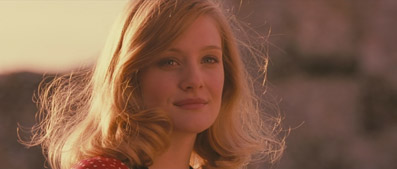
Romola Garai in her first leading role proper since launching a promising career with I Capture the Castle, plays Anne Keyes, an upcoming actress and the adopted daughter of an aristocratic family trying in vain to avert the course of war so as to protect the establishment and their way of life. This is of course, in the hindsight of history, a position of rose-tinted naivety, a point of view the film's picturesque magic-hour opening makes all too plain before so much as a single line of dialogue has been uttered. Whereas most will no doubt find this approach clumsily heavy handed, I found it to be a succinct way of comfortably locating the story in the Poliakoff cannon and alerting the viewer to the extent of how the heroine's perception of reality is riddled with uncertainty. Whether or not you get off on the wrong foot with Glorious 39, largely depends on your affinity and familiarity with Poliakoff's oeuvre, characterized by cleverly conceptualized but nevertheless, glaring symbolism.
Anne's life is endangered and everything she thought she knew is held up for re-examination, after she stumbles across a seemingly innocent enough collection of gramophone records in a cordoned off section of her father's vast estate. Playing what she believes to be a Waltz, she then becomes privy to the clandestine discussions of government officials planning to bump off Winston Churchill's most vocal supporters to secure Neville Chamberlin's seat of power and the chance to enter into negotiations for peace with Adolf Hitler. Before Anne has to start fighting for the truth and her life as a haunted, hunted sleuth-on-the run, Poliakoff makes the near ruinous decision of book-ending his story in the present day. Undoubtedly in surer hands, the set-up would have had plenty of ominous potential, suggesting secrets so harmful that their scars reach across time as well as bloodlines. The intent I'm sure, was to allow a family plagued by memory through the generations, an opportunity to atone for their tunnel-visioned, manipulations of a past that is but a stone's throw away from our present. However, when seen in context of the cornball cheat of an end reveal that is less denoument than last-second horror movie twist, these scenes amount to little more than Poliakoff wanting the audience to take him very seriously indeed, if only because they feature a grave-faced Christopher Lee and Corin Redgrave. This deceptive opening erronously lends the film the false air of a prestige picture, rather than the pulp thrills of the slightly sordid, big-budget genre piece it actually is. I don't know what's more ironic, that scenes of such overreaching weightiness feature an actor best known for his work in Hammer Horror or that the writer/director's façade is as questionable as the one committed by his characters in the narrative.
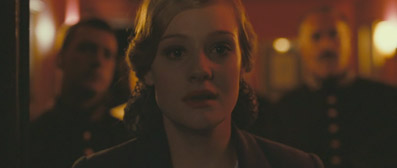
These elder statesmen of the cast aren't the only ones being shoe-horned into the film to try and bring in an altogether different type of audience for this kind of fare. Julie Christie is unremarkable in a role that never calls for, or remotely taxes her abilities, Hugh Bonneville struggles with the presiding tone (though can certainly be forgiven given Poliakoff's perilously skidding grip on his own material), but chief offender among them is unquestionably, Bill Nighy whose auto-cue line readings muffle every would be thunderclap of revelation. The only resultant shock from his portentous dialogue is just how expositional they're revealed to be in monotone. Laying out his back story as the first great war's most unperturbed, indifferent veteran, it's impossible to buy Anne's father as a man driven to do everything within his political power to ensure war doesn't devastate the country a second time.
It's a testament then, to Romola Garai's uniformly excellent portrayal, that her efforts are able to sustain Nighy's deadly sleepwalking. The discrepancy of liveliness in their scenes together is akin to watching an enthused dinner party host's unsuccessful attempts at deflecting the comments of a thuddingly dull guest. Miraculously though, Garai escapes these interactions unscathed and is mercifully given a couple of screen partners worthy of her considerable conviction, in Eddie Redmayne as her suspicious brother, and Jeremy Northam as a government spook. Both convey distinct registers of disquieting malevolence and menace, see-sawing between The Stepford Wives and Invasion of the Body Snatchers. Redmayne is certainly poised for great things after impressing with this, and previously more than holding his own with the impervious Julianne Moore in Savage Grace. Jeremy Northam is an actor whose every screen appearance leaves me bristling at the fact that no one other than me seems to think of him as the national treasure he ought to be regarded as. His role in the unfairly skipped over Dean Spanley, provides a baffling question mark as to why leading roles continue to elude him. In the bones they do throw his way (and there's hardly any meat on them here), there's always the equally elusive promise of the generation-defining Sherlock Holmes that never was.
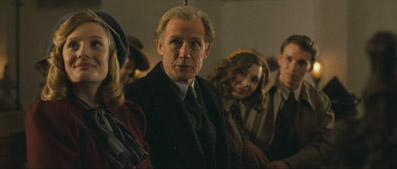
While they are to be applauded, the major cause for celebration (and relief for her fans) is the presence of Romola Garai, finally, once more in a leading role. It's clear the actress relishes the opportunity to shoulder a film, never anything less than fully committed. It's the kind of juicy part longtime admirers of her astounding stage work have been waiting to see replicated in some way on screen. Poliakoff seems to sense this occasion as well, and not content to just put her in the lead, he goes the extra mile of showing her off in it, more than matching the range of her portrayal with an ever-changing, eye-pleasing, wardrobe. Anne wears only the best contemporary designs afforded by her father's wealth and standing, a new outfit for each and every scene. With more costume changes than Axel Rose at a Guns n' Roses show, Garai never looks anything less than glorious, even when she's running and screaming. Beyond how well she wears the clothes, what impresses most is her gameness in the role, navigating each deeper cliff dive into evermore-uncertain genre territory with assuredness and ease when other members of the cast struggle. Watching the customary spark in her eyes slowly deaden, as the bodies of those challenging the "spineless leaders of democracy" pile up around her is a genuinely unnerving trajectory; one which charts in her eyes, body language and tone of voice, the similar psychological decline of Catherine Deneuve in Repulsion or Mia Farrow in Rosemary's Baby. In visualizing the character's deep descent, due credit must also be given to the make-up department; when Anne escapes a lengthy period of imprisonment, her complexion is that of a woman lost inside herself after scouring every inch of her soul.
It helps that Garai is given some fantastically staged set pieces to hammer home the creeping sense of fear and confusion. One sequence couples chills with ingenious delivery of plot exposition; whispered lines between takes on the set of her latest movie, that Anne only discovers when recording additional dialogue in a film studio. Another turns an innocuous village vet's into a pet cemetery with gothic stylings reminiscent of the great Val Lewton. While not all references reward (a creepy Omen-like child played by Stanley Kubrick's grandson, is instead comically rotund and just as wooden as Nighy), I for one, appreciated the cinematic tonal detours when character motivations strained plausibility.
While you can certainly feel the tension in Garai's eyes at every moment, it's a shame that the film as a whole doesn't earn her reactions. Sweepingly beautiful but unanchored camerawork renders the paranoia never more than moderate, leaving Glorious 39 neither convincing as a period piece (embellishing fact for gaudy chills) or as a thriller (overlong and mostly static), but its gothic leanings and the unwelcome colonizing of the protagonist's home and mind, by way of a nod to surrealist cinema and the tradition of home invasion films, is unexpected and exciting.
What I at first suspected was a transfer struggling with the sheer amount of grain on the film stock, was in fact, as the commentary reveals, the heavy use of smoke in interior locations. It's not said why, but most probably to simultaneously suggest a dreamy but untrustworthy nostalgia for the period. On second viewing, my understanding of this approach saw my appreciation of the picture and the film as a whole soar. Sombre hues of landscape are enough to make you shiver and the digitally manipulated scenes of a picturesque summer shot in wintertime are thoroughly convincing. The colours of Romola Garai's costumes are bold and vibrant with skin tones that showcase a natural glamour. The transfer is framed 2.35:1 and anamorphically enhanced.
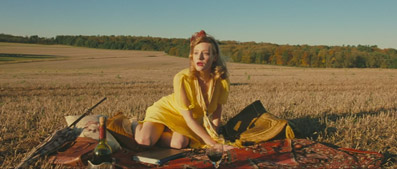
Weather, not war is what the rear speakers have to work with on the 5.1 soundtrack. The sudden withdrawal of these subtle atmospherics for maximum creep factor is what draws your attention to them and rewards on a second viewing. Surrounds of chirping insects and wind-kissed grass puts the viewer right there on a balmy summer afternoon. For the rest of the time, the audio track services the score and the dialogue of a drawing room drama that talks of the war but never lets us see it.
The disc gets off to a promising start as early as the menu screen, featuring Adrian Johnston's transportive score. The complete unavailability of this music after both the cinema and DVD release continues to frustrate and I can't help wishing it had at least been included as an isolated score audio track. I remember loving this kind of feature when it was first included on the initial release of L.A. Confidential, back in the early days of DVD and expected it to become something of a standard supplement unique to the format. Sadly, this was not the case, and I couldn't even count on one hand the number of DVDs which have included this option. With score albums being such a niche, unprofitable market these days, surely this is the best way to please the film music-loving anorak and ensure sales of the DVD? That said, the music, coupled with big widescreen shots of Romola Garai sprawled out against the golden English countryside of yesteryear are suitably intriguing for the first time viewer. The big, bold title font of the film's poster is pleasing on the eye and an easily navigatable menu screen (harder to come by these days) is always welcome.
On the Edge of War: Uncovering Glorious 39 (8:05)
Up first is this short EPK featurette, which instead of uncovering anything about the war or worthwhile insight into the filmmaking process, predictably sets the stage for the film's thematic content and the intentions and concerns of writer/director Stephen Poliakoff. Fairly standard, but there are a few worthy tidbits to be gleamed. Poliakoff talks about the twofold inspirations of the title, recalling what those old enough to remember, will attest was an extraordinary, one-of-a-kind summer. Extraordinary not only for the exceptional weather, but as a marker of the end of an era and the grand country house side of England.
Romola Garai, a year older than myself, talks about how appeasement was not a point of focus in her studies of World War Two at school, odd because I remember that part of the curriculum pivoting around Neville Chamberlin and the "spineless leaders of democracy".
Poliakoff stresses how as a nation, our history was a whisker away from being that of one of Europe's many puppet states, had we negotiated with Hitler. He also maintains the truth behind of the extent secret service monitoring depicted in the film; that those in politics speaking out against appeasement were under constant surveillance.
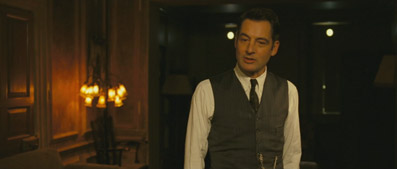
Actor Hugh Bonneville's take on the film chimes very much with my own; that the film is successful in taking an epic event in human history and condensing it down to a family situation without being laboriously or distastefully metaphoric. One time Doctor Who, David Tennent, goes one better calling it "history mixed with Hitchcock", though Billy Nighy is quick to point out that Poliakoff's presentation of history throughout his work always feels very 'present' and real.
It winds down with the obligatory bit of backslapping, and once Romola Garai comes clean to going all 'fangirl' in front of icon Julie Christie, who she unsuccessfully tried to see as just another colleague, Christie responds by saying that she finds her young co-star to be a wonderfully exciting actress who's thrilling to watch. She then makes the exact same remark about Juno Temple, who has you reaching for the sick bucket in five seconds flat, barreling on about just how talented each and every person on this film is.
The opening line of my review suggested a filmmaker revered not just by those he works with, but an entire nation of people viewing at home on television. No surprise then that the lion's share of praise is heaped on Stephen Poliakoff. Bill Nighy has the last word, noting a prolific body of work that adds up to a national institution.
Close Up: Stephen Poliakoff (25:38)
In light of Poliakoff's incredible body of work, the title is misleadingly disappointing. This is the first theatrical outing for the TV stalwart in twelve years, so it's unsurprising that for many viewers, this will be their first exposure to such an esteemed and prolific career. I wanted to be excited all over again by the films I've seen and the many more I'm yet to watch. I was looking for an excuse to finally bump his entire filmography to the top of my rental list and plow through them marathon style. I needed that push to finally plug a gaping hole in my knowledge of cinema and become an expert on a filmmaker who's been on my 'to do list' for far too long. I needed an in-depth, hour-long feature that covered his career from the beginning, all the way through to Glorious 39. What I got instead was a breezily informal interview with the writer/director telling the story of Glorious 39 in his own words. Expectations were thankfully dashed, as the man I assumed would be droll and dryly academic, is instead an erudite and engaging intellect who packs an awful lot of information into twenty-five minutes.
The interview is the full version of the snippets glanced at in the EPK and regurgitates the origins of the title, though this time at greater length. A point is made early on that I hadn't even considered while watching the film, that this is the first time a fiction film has delved into the conflicts raging in the strata of the pre-World War Two government.
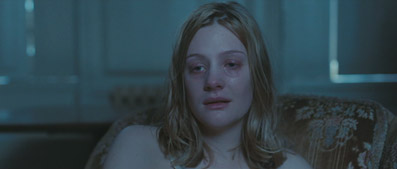
Poliakoff states that the focus in cinema has always been on Churchill rather than Chamberlin. His inclusion of the family dynamic in the foreground of what could otherwise have been an all-together more 'inside look' at the political movers and shakers, is explained by his desire to put the audience inside history rather than peering down at it while eavesdropping on conspiratorial conversations in the shadows of Parliament. It is clear in his citing of Rosemary's Baby as an influence, that Poliakoff was out to make more than just a straight political thriller. This is later confirmed when he takes us through the film's various set pieces, with which he aimed to satisfy genre tingles, yet all the while giving you the sense that this really could happen. While it's possible to reduce the film to a tale of good vs. evil, it's not one that operates on a fairy tale level.
As he's talking in larger terms about the story and its themes, Poliakoff points out many interesting observations he made while researching the project. One of these historical footnotes I'd never known about before watching the film and was morbidly fascinated by, is the people of England having their pets put down en masse, knowing that the cities they were evacuating were about to be bombed to smithereens. Leaving with the few provisions they could carry with them, this was seen as the humane thing to do.
Poliakoff also takes potshots at Chamberlin throughout, going so far as to call him "thick" for not realizing that his continual winning of his favorite game of musical chairs at lavish country house parties, was only because the guests allowed it. He dresses down the former prime minster, listing his impatience with any opinion that wasn't his own, his inability to forgive those who opposed him and that while many of the political elite opposed the war after just having lived through one, Baldwin and Chamberlin as the two chief appeasers had no experience of the trenches.
He then moves on to his leading lady, talking about both the character and the actress. Apart from the rich, relatively untapped historical backdrop, his main motivation for writing the film was his own Jewish ancestry, as someone who wouldn't be here at all if Britain had negotiated with Hitler, inevitably colluding in the extermination of minority races. The decision to make Garai's character an adopted daughter with a minority lineage was a conscious representation of the false sense of security felt by many in Europe at the time. As British society got it's first glimpse of fascism through the abolishment of civil liberties and Habeas Corpus, it was clear that anyone not truly belonging to the elite and protected (in this case, by blood) was under threat.
Of Garai herself, Poliakoff keenly enthuses about her charisma, commitment and lack of vanity in a leading role he was only to pleased to give her, since following her career from its beginning. Garai and many of the younger members of the cast, such as Charlie Cox and Eddie Redmayne ("the new Olivier") are spearheading what Poliakoff believes to be an "invigorating and stimulating" time for British talent that's on the brink of exploding.
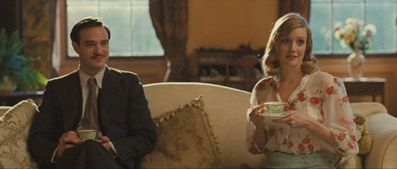
Switching to the elder statesmen and "legends" among the cast, he speaks of the personal validation of Christopher Lee being "so into" and moved by the script as someone who witnessed the Nuremberg trials first hand. Most tellingly of all, this is the third time he and Bill Nighy have worked together after Nighy took home a Golden Globe for his performance in Gideon's Daughter. Poliakoff is clearly enamored, having written the part with him in mind. This confirms why Nighy's sleepiness here wasn't immediately called out and addressed. It's clear a more objective eye and firmer directorial hand was needed.
Audio Commentary with Director Stephen Poliakoff and Actress Romola Garai
The previous interview was an encouraging indication that a commentary with Stephen Poliakoff would be two hours well spent, not to mention that my favourite actress of the moment was giving her first feature length narration. While my expectations weren't exactly met, on reflection, it's a commentary that's hard to fault. Perhaps I was let down by the sole focus on the themes of the film, rarely straying towards life on the set or the working relationship between the two. You learn a lot about the film but not nearly as much of the individuals talking about it. As to be expected from past interviews and their collective body of work, both come across as fiercely intelligent and considered, yet their analysis of the work has the accessibility of a student study guide; lots of information and background is imparted without ever making your head feel like it'll explode.
The abiding impression of the duo is that they are both fully engaged with the film on a very deep level. The scene in which her character is recording additional dialogue for the film within a film, prompts Garai to evaluate how actors continually revisit their past work. She points out that ADR is usually done a considerable amount of time after you've shot a film and that promotional duties follow sometimes as late as two or three years later. In this way, an actor is constantly being presented with their past, talking about it and interacting with it in an endless cycle. These aspects of Anne's profession mirror the world she's in, with people constantly having to confront their past and their actions.
Garai's observations prove shrewd throughout and she's very much the equal of Poliakoff in intellectualizing the film. She remarks on the significance of Anne's discovery of a conspiracy in her childhood bedroom; a reflection of the infantilized Britain of the time and its subsequent loss of innocence.
Both commentators question the innocence of the British position of the time and urge us never to forget just what a close run thing the nation's possible capitulation to Hitler was. The seething discontent towards Chamberlin's government that courses through the film is accredited to both the director and star having European blood and likely knowing they wouldn't be here if the no war payoff had come to fruition.
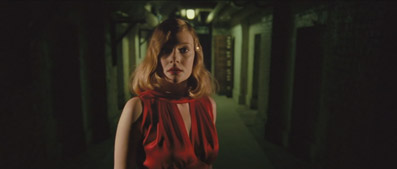
An interesting point, but it led me to think that this idea of the dangerous "what if?" wasn't nearly as pervasive in the finished film as the pair believe it to be.
As for the plot mechanics, Garai asks us to contemplate how much harder Poliakoff's rug-pull set-up makes it for the actors who have to play all their cards close to the chest until the final minutes. Complimenting the rare modesty of co-star Eddie Redmayne, she stresses how hard it is to hold a secret for almost an entire film, when your raison d'être as an actor is to communicate what you're feeling. Instead, as a genre piece, this had more to do with communicating information to move the story along, something the actress admits was a first for her. My favourite note of the commentary that actually impacted me watching the film a second time was cinematographer Danny Cohen's use of applicable vivid stock, that makes Anne's signature yellow dress ping with heightened Technicolor. This yellow against the rolling greenery of the Norfolk hills is a striking contrast that stays with you after the film and Poliakoff points out that this was a way of visualizing Anne's status as an outsider within the family. For my money, it's also one of the first surrealistic hints of the psychological horror that is to follow.
By no means the astounding commentary it could have been, it endeared the film to me that much more and is heartily recommended to those intellectually stimulated by the film.
Glorious 39: The London Premiere (2:25)
The stars and director plugging their film before the cameras and crowds of fans gathered at the Odeon Leicester Square as part of the 53rd London Film Festival.
Costume Gallery Sketches
Five drawings with selected fabrics attached show the attention to detail designer Annie Symons put into making Romola Garai look glorious. The costumes are undoubtedly stars of this film in their own right, so it's a real shame sketches for all of them weren't included, ideally along with photos of costume fittings and on set stills to give them the highlight they deserve.
Photo Gallery (2:22)
A series of production stills set to the sumptuous swellings of Adrian Johnston's score.
Trailer (1:33)
Atonement as a thriller is what the marketing would have us believe, but Bill Nighy's lines (alternate and worse readings than those in the finished film) render any attempt at suspense ineffective. The music is also way too modern, pitching it uneasily at the pace of a Bourne Sumpremacy, which the awkwardly hard cuts fail to match and fall behind the beat. The ball is dropped right up until the title at the very end, backed by the foreboding wail of a blackout siren, which lends a sense of fatalistic doom.
I suspect, just as with Martin Scorsese's Shutter Island, Glorious 39 inevitably suffers from the expectations of the auteur's dedicated audience. Where you might expect to find a refined film, you have a thoroughly entertaining one so long as you're willing. Differing modes of dissemination certainly, but no less preoccupied with Poliakoff's usual themes of past guilt and people's unknowing capacity for evil in pursuit of a cause. A gloriously deranged surprise for the zealous cinephile, but far from the credible period re-creation that those most likely drawn to it will want it to be.
|